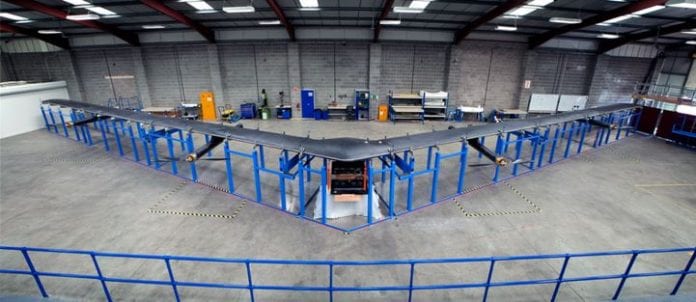Facebook Inc (NASDAQ:FB) announced that its Connectivity Lab completed building its full-scale drone called Aquila designed by its aerospace team in the United Kingdom.
The social network giant said Aquila is ready for flight testing. Aquila has a wingspan of a Boeing 737, but weighs hundreds of time less at around 880 pounds due to its design and carbon-fiber frame. The full-scale drone is intended to provide internet access to people located in the remote areas of the world.
According to Facebook, Aquila will be able to circle a remote region in the world for up to 90 days. It will beam internet connectivity to people from an altitude of 60,000 to 90,000 feet. The Connectivity Lab built Aquila for 14 months.
According to Yael Maguire, engineering director of Connectivity Lab, helium balloons will be attached to the Aquila to float it up to the air. He added that Facebook is the first company to test flight a drone at such altitudes.
Maguire also said Facebook has a team working with policymakers to help set guidance for the drone. He emphasized that the social network giant currently does not have to face immediate legal or policy problems to the drone in the United States. Facebook intends to start the flight testing for Aquila by the end of this of this year.
Facebook Connectivity Lab helps accelerate development of new technologies
Last year, Facebook CEO Mark Zuckerberg said the Connectivity Lab was created to focus on delivering internet access using drones, lasers, and satellites. The social network giant also acquired Ascenta, a UK-based company that developed the first version of Zypher, the world’s longest solar-powered drone.
Facebook also launched the internet.org as part of its initiative to provide internet access to billions of people around the world. The social network giant in partnership with mobile operators across 17 countries, were able to provide basic internet services to a billion people since the launching of the internet.org.
Jay Parikh, vice president of global engineering and infrastructure at Facebook said deploying internet infrastructure cost-effectively in remote areas is challenging. According to him, the company’s Connectivity Lab helps accelerate the development of a new set of technologies that can drastically change the economics of deploying internet infrastructures such as fiber-optic cable, microwave repeater and cell towers.
“We are exploring a number of different approaches to this challenge, including aircraft, satellites and terrestrial solutions. Our intention is not to build networks and then operate them ourselves, but rather to quickly advance the state of these technologies to the point that they become viable solutions for operators and other partners to deploy,” said Parikh.









